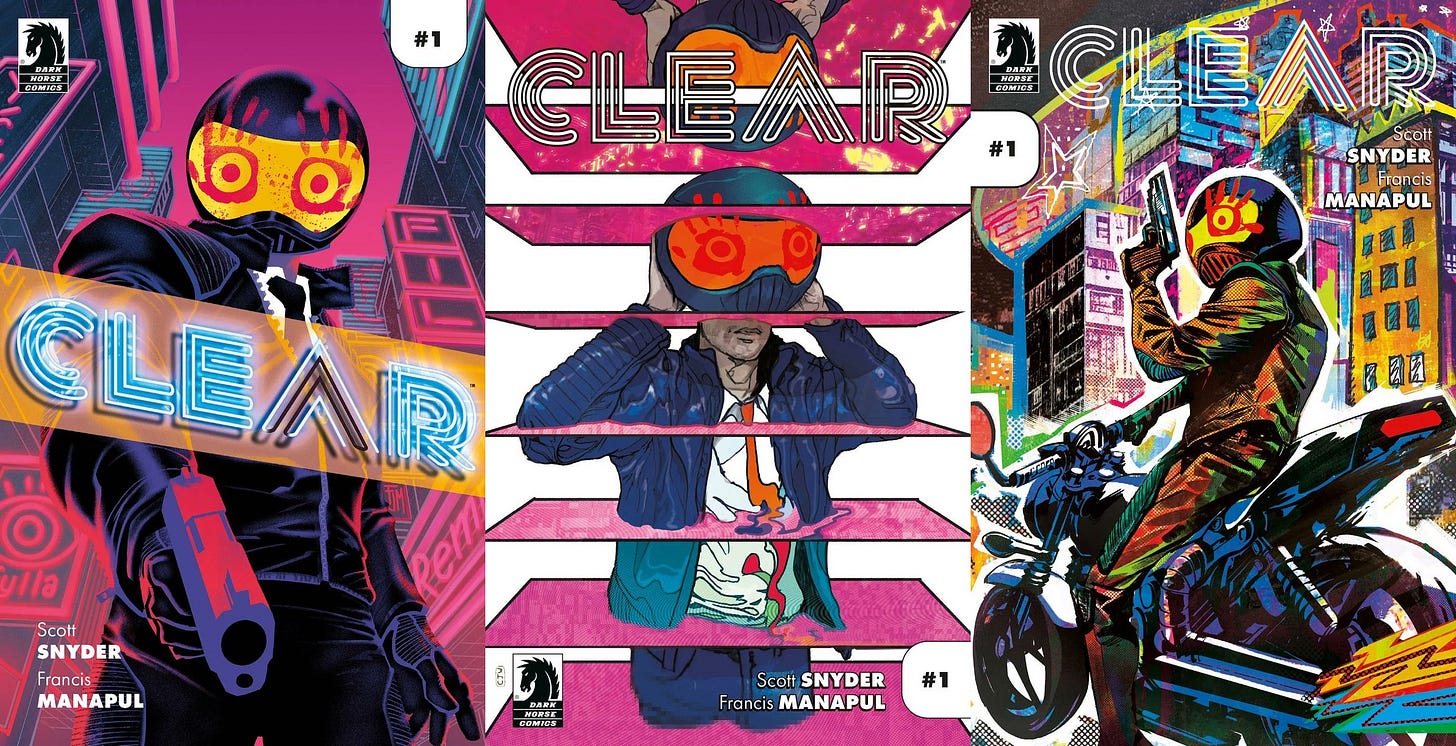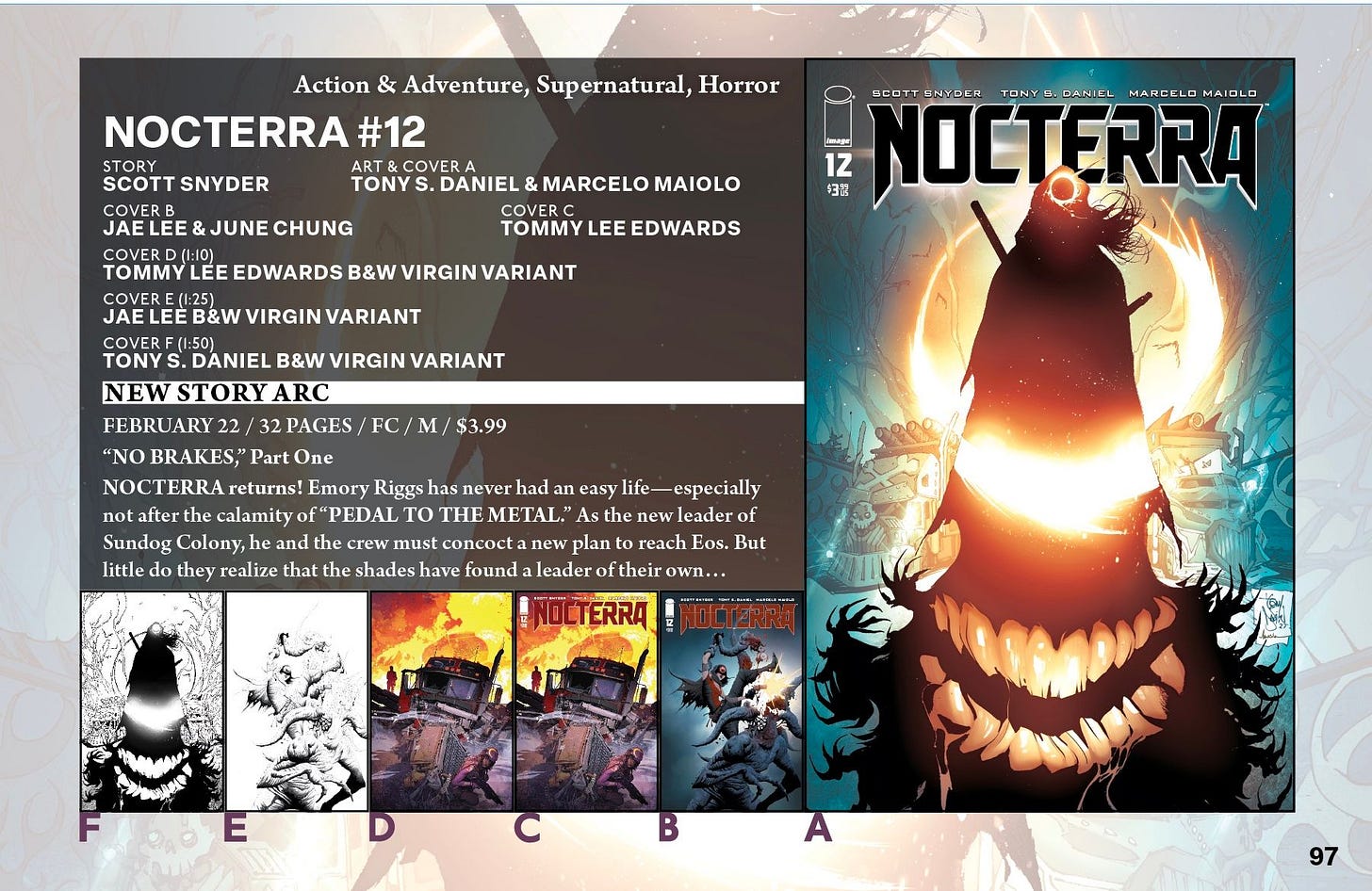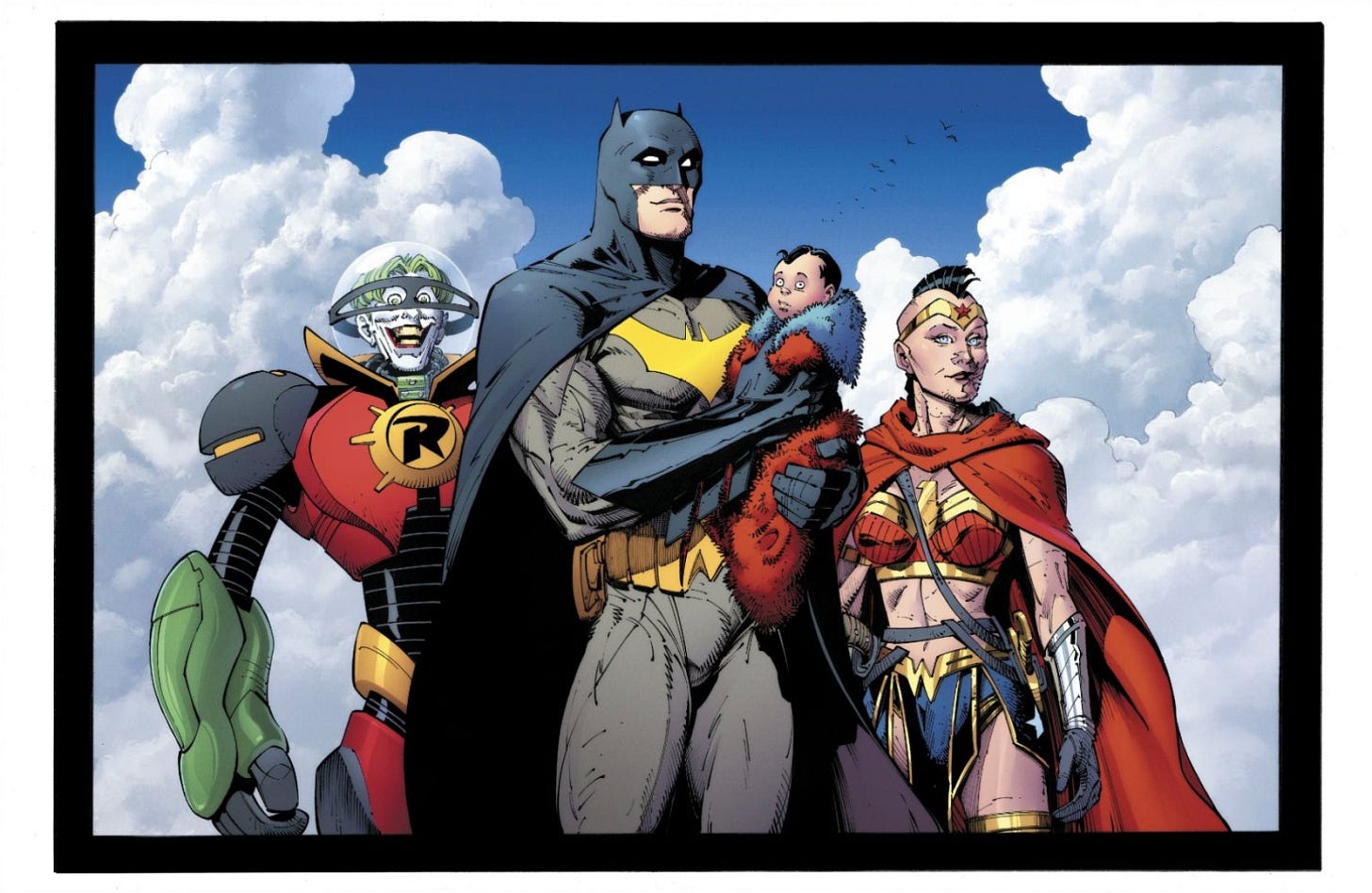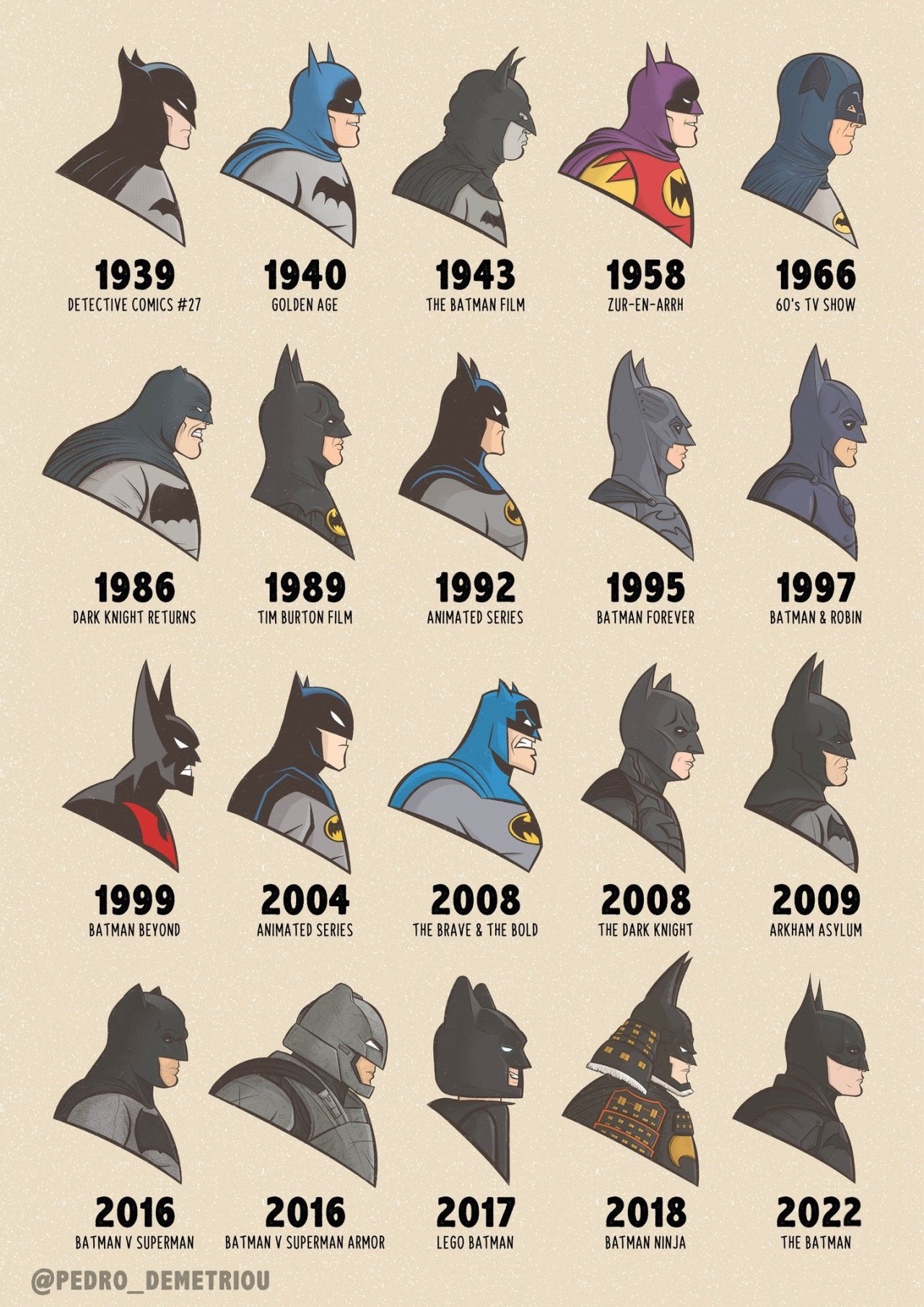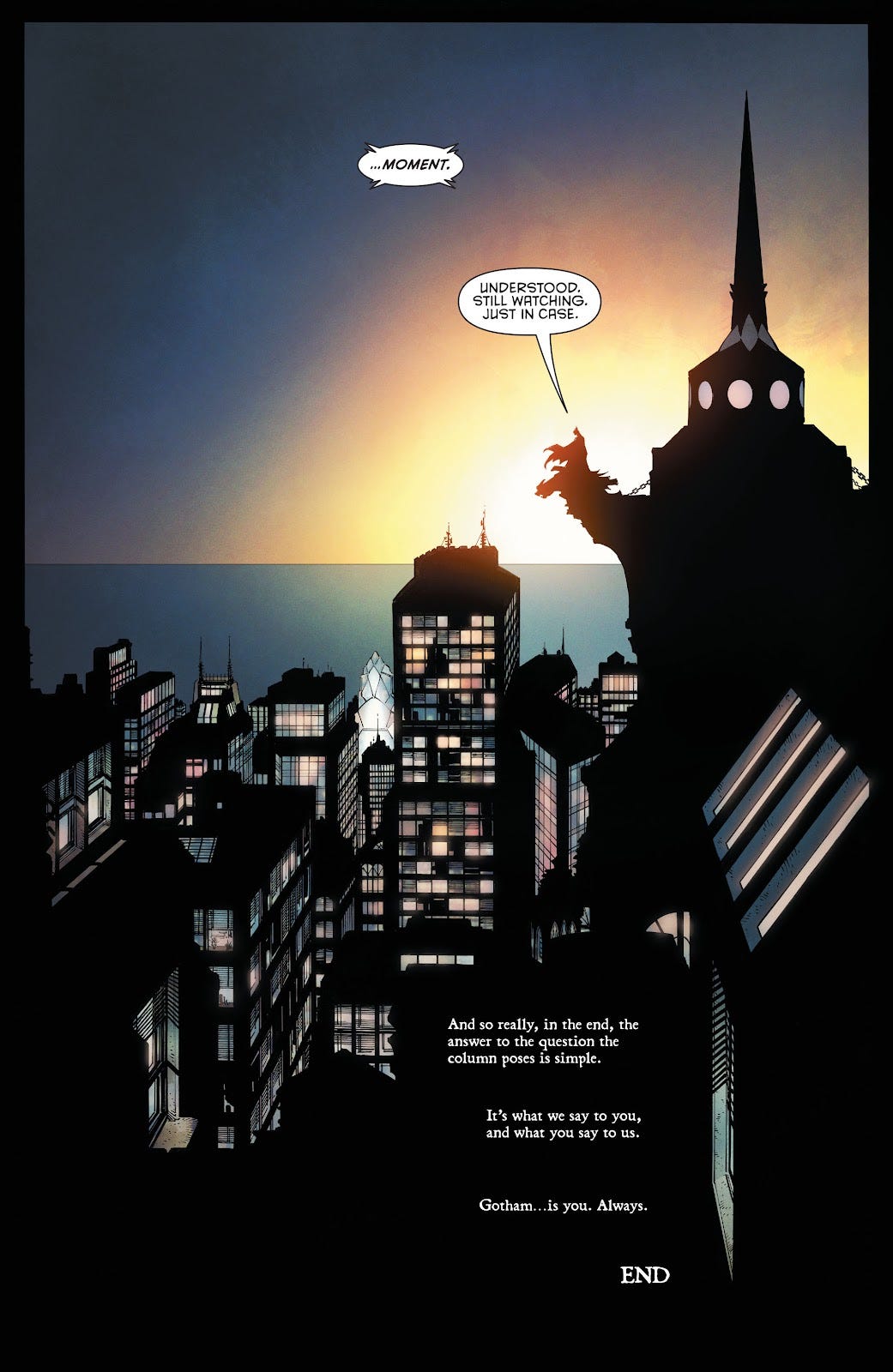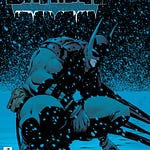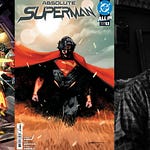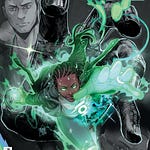Hey guys, it's Scott.
It is Friday, January 27. I am so sorry that I missed a Tuesday post. Full disclosure, we had a bit of a house issue. It was my fault, a bit of a mini-flood after I left something on. So it caused a bit of chaos in our house, and I apologize, but things are starting to right themselves and we're back on track and everything's alright. So it's just a crazy week. But I am really excited to dig back in with you guys. I've been going through submissions for class and they're just great. I wanted to sort of talk about one topic today that's been on my mind lately, and it's weird—it's pain in storytelling. It's hurting characters and creating things that challenge people. I keep thinking about it the last couple of weeks. Maybe I'll bring it in into class a little and I'll talk a bit more about it in the post. But before I start, just a bit of housekeeping…
First, we have Dudley Datson and the Forever Machine #4 is out this week, it's the penultimate issue. I'm really proud of this young adult/all ages book co-created by Jamal Igle. I think it has all the scope and expanse of a big epic space adventure, but it's a pretty intimate book and based on a lot of personal stuff, both for him and me, and I'm really proud of it. So I hope you'll check it out.
Also, we have Final Order Cutoff coming in a week and a half (February 6th) for Clear #1, the first issue of this big sci-fi series that I did with Francis Manapul for Comixology. It's now coming out for Dark Horse in three oversized editions, they did a great job with both We Have Demons and Night of the Ghoul and now this. We're going out with it for TV and film next week, so I'm really excited about it and I hope you'll order high because we're really really proud of it. It imagines a future where all of us can connect to the internet neurologically and skin the world however we want, we call it veiling. But it means creating a filter over the world where the superstructure remains the same, but the cosmetics of it change to whatever you want, so you can look at it as though it's 1940s Glamour, a zombie apocalypse, a porn setting, or an alternate past Vietnam, or whatever you want differently. So it leaves the entire way that you see the world up to you and makes everybody live in their own subjective bubbles. And it's a murder mystery that happens in this world, It's kind of a sci fi noir. So we're super excited about it. It was pretty critically acclaimed when it came out digitally, and I hope you guys will give it a chance. It's got some cool extra features, and we have a lot of incentives for retailers. That's February 6th.
And the week after will be the Final Order Cutoff for Nocterra #12. Nocterra is back! We were going to launch in February, but since Tony posted about this I feel comfortable saying it—his daughter had a health issue, which is basically resolved, but we both felt that even though the issue is done (we're actually working on the fourth issue right now, five for the arc) we felt that it would be tough to get in the headspace of promoting the book when he had so much going on personally. So we figured we’d just wait and get back in it when everything was in a happier place. And now that it's getting there, we can really give it our full attention and full promotional force to let you know how many cool things are coming in this arc!
Okay, so pain. I was watching Downton Abbey the other night with my wife and we love that series, and I think the movies are terrific as well, but it got me thinking a lot. I saw something else, a couple shows, honestly, that had been falling into this pattern, and it got me thinking about comics that do it too. I feel as though there's just a lot of this, both with movie sequels and comics right now I think are fractious. There's a lot of books that are really beloved by smaller audiences in different ways and I think the inclination sometimes is to cater to that audience by giving them what they say they want, which is for their characters to be happy. I dealt with this a lot on Batman, you always do. I never made it all that public, but there was always a lot of hate about “why do you torture Bruce so much? Why can't you let him be happy? Why can't he have a nice family dinner or get married or have kids? Why can't he grow? Why can't he grow up? Why can't you let them grow old happily?” And there's a logistical reason for that, which is that if I marry him and let him age 10 years and that, then the next generation coming in misses out on the core character. And you just can't do it for company reasons in a certain way unless it's an Elseworlds story or a Black Label story, in which case you have all this great elasticity, like we did with Last Night on Earth and all of that stuff.
So there's ways of doing it, but in main continuity it's very hard because they want the character to essentially remain as close to that original or internationally-known concept as possible so that when a new reader or viewer comes in, they see that character they've heard about in a way that's basically primal and pure and known and familiar, I think is the key. But if you look at all the different variations on Batman in animation and movies and that then there's still fluidity, there's still ways of stretching him. But that core stuff about him being unmarried, all of those kinds of things are baked in.
But the thing I'm getting at is more than just about superheroes, it's about being able to move away from catering to an audience in a way that gives them what they say they want, but what they don't really want. Because ultimately, while it is fun, and this might be a hot take, but I don't believe that books should be escapist. Essentially, whatever you're writing about, if it matters to you, is touching on something that you fear or hope for, even if it's just giant good vs evil space battles. They speak to your morals, your ethics, the things and values that you want to communicate to people, the way you see the world. But I think the closest thing to escapism is when a story is just happy and there's not a lot of conflict. And for me, I think I see a lot of this lately, and maybe it's because the world is so trying. These are really difficult times, they're anxious times, they’re times when there's a constant feeling of worry. I think we're much more aware of the things that threaten us, both globally and locally, than people were 60/70/80 years ago. You live in a constant state of getting to pick on the dial whether you're worried about civilization-ending events, global warming and war, or smaller ones about everything from inflation to tribalism to the erosion of truth, whatever. But we're constantly bombarded with whatever worry we choose on the dial. So there's a desire for happy escapism in that way, if there is such a thing. So to me, again, just to define escapism, the closest thing to it is when the story has no conflict. That still speaks to what you want out of the world as a writer, I think, so there's a connection to something, but it's the closest thing in my mind to what I'd consider it.
And so Downton Abbey has gotten to a spot where that show initially put its characters through the wringer in the first few seasons, but people fell in love with the characters so much, and I think the writers fell in love with the world so much, that it became a series (and a series of movies) where nothing bad happens to the characters beyond the most resolvable problems. So you wind up just having fun being with them. You just want to be with them the way you want to be with the characters in Cheers at a bar. And you want to see good things happen to them, you don't want to see bad things happen to them. And there's a reward in that, I love watching those, but my argument, and again, this could be controversial (please say in the comments, come at me, because I want to hear your take), but you will never to me write something great if the characters don't help people through, in some way, some challenging fear. You have to be able to put pain on the page, you have to put them through the wringer so that they can come out the other side and grow in a substantial way. Growing to me isn't “guess what, here comes the page turn! Ohhh, it's their old friend from home!” It can't be “oh, look, it's Robin coming to visit Batman!” I mean, yes, that's fun, but that can't be the big reveal. That doesn't mean that it has to be salacious and sensational and crazy and that characters can't have moments of tremendous joy, they need it for the texture of a story, but you also have to be willing to hurt them.
The thing that I felt strongly about with our Batman and everything I do, all the books I'm on, is that you have to be willing to make your character face a fear in a way that really shakes them to their core, to have them be somebody that people wind up loving. You love Superman or Batman or Erica Slaughter or Rick Grimes or Spawn because they face things that you are afraid of, or they activate fears that you know deep down, touch a nerve. And you see them struggle with them and you see them lose and you see them sacrifice only to come out the other side having faced that and be wiser and better and tougher. And maybe they lost something along the way. Maybe they're hurting for it, but you love them because they did it. And that to me is where great stories come from. It doesn't mean you can't love something or enjoy it or choose it, and it doesn't make those stories any lesser to me of a hard thing to write, like happiness and all that. It's just to me, in my opinion subjectively, putting pain on the page, putting your characters through the wringer, making them hurt, putting your fears on the page so that they work through those fears in a way that allows you and the readers to have an experience and a journey and go through something so that you come out tougher and wiser on the other side—that's a great story.
So I would caution you, I get a lot of comments when I'm writing American Vampire, things that have been going a long time, Batman and all of that, “please let this character be happy.” I will let them be happy. I want them to be happy. But they're happy so that then they can also have moments of equal terror and hardship and conflict and sadness and all of that, because they're not living people that you are watching through a lens to escape your own life to just see happiness. Their characters that are designed to help you work through the things that you're afraid of in life. That's what they're there for. That's why they're heroes in that way. So for me, it was interesting. I love the experience of watching something where you're revisiting something like an old blanket, an old, wonderful, happy thing. And there are a lot of movie sequels like this that revisit a world just to sort of give you a fun, happy tour. But I'm proud of the fact that the only issue I wrote like that was the last issue of our Batman, and that was because after all the shit we put him through for six years, the fun was to say, “you get one night off, one night,” as a thank you to fans and to everybody. And that's one of my favorite issues. I mentioned it as the most effortless to have written, I think, the entire time on Batman because it was escapism.
So anyway, in closing, I'm reading a lot of submissions, you guys are clearly very good at putting your vulnerabilities on the page. But for anybody looking to write, or anybody even just looking at craft, when you go watch something like Wednesday, or The Last of Us (which does this in spades), see how they hurt the characters. Hurt the character so that you hurt with them. It might be uncomfortable, but they come out transformed when they overcome that pain. Sometimes they don't, sometimes the story is about not overcoming it. But to me, don't be afraid of that. And don't listen to people that say, “all you should do is make the characters happy and grow in a way that's safe.” Because if it was safe, they say they want that, but then it's boring and nobody wants it. I'm telling you, you have to move past it. It doesn't mean a character can't get married, it doesn't mean they can't have kids if you're corporately allowed or if it's your book. It just means don't be afraid of, if you do that, also making them hurt, unless you just want to make something that makes people happy to exist in that world. And that's okay, too. But I just want to draw a line between them to be able to say, I think personally, that to me, there's nothing wrong with that ‘quasi-escapism,’ but understand what you're doing as opposed to giving people something that they will not only enjoy escaping to, but love in a way for helping them through hard things as opposed to just moving away from those hard things.
Okay, so let me answer a couple quick questions from you guys:
Melissa Mars asks, “How does Scott deal with multiple projects and ideas at a time in terms of scheduling and focus?”
I really need to, as Ty will tell you and confirm, compartmentalize. I really cannot jump from one project to another in a single day, or even two consecutive days, unless it's absolutely impossible to avoid. And I can't really even think of a time it has been. I need two to three isolated days on a project. I re-read everything, I get back into it, I live in that world for a couple days just thinking only about that. That's just for me, other people can jump masterfully like an acrobat from one thing to another, but I can't do it. I really need to be isolated, ideally for a week at a time.
Okay, second question:
gordidon asks, “Will you rewrite a project that is already 4+ issues in or should you focus on the next couple of issues and make it the best it could be?”
One of the great things about comics, a scary thing about comics, and one that people don't think about, is that as you're writing it as it's coming out. So you don't have the luxury of doing something like you could do on a novel where you could go back and rewrite the beginning once you know the exact particulars of the end to make that beginning seem like you're a genius and you figured everything out, not just the ending, but everything. So it's hard. I mean, it starts coming out and you can't go back and rewrite it at that point, unless you're gonna redo the trade, and you don't want to do that. I mean, if it's something you haven't published yet, if it's something egregious that you think makes it a bad book, what you have to understand is it's collaborative. You're gonna have to go to your artist, your co-creator, and be like, “listen, this is what I think. Are you willing to do this? We can sell it and put this other material in the book as a kind of ‘see how much we put into it, we realize we were on the wrong path and this is extra material.’” And if you have the money and they're willing to do it and they agree, then yeah, if it's something that really makes your book significantly better, yes. I mean, I would redo it personally if it's something that you can afford to do and you have time.
For me, it really is if it dismantles or it really upsets the mission of the book. I've definitely been partway through a story and realize there's a second meaning, or I've been partway through his story and realized that it has a slightly different theme that I thought. Then I will go back into the trade, even, once it comes out in trade, and rewrite a few things here and there to make sure that it's smoother. But I will focus on those last issues and trying to get things across more clearly there. I do think that ,again, having an outline at the beginning is key for me. So I've never had to rewrite anything in any major way at that point. But if I was behind the scenes, I've definitely realized things needed an extra scene, needed this and that, and asked an artist to do it and paid extra for it and all that. But it all just depends on your situation, and above all, I would really focus on asking “does this make my story something I'm not proud of?” “Does this make my story something that's saying something that I disagree with now, or is it still communicating the same message and it's just going to require some fixing?” “Can I fix it in cosmetic ways and in trade?”
Alright, you guys this has been a long post. I appreciate you listening to me this long, but I'm sorry I miss Tuesday and I'm excited to dive in Tuesday, I'm excited to dive in next week, and thank you guys for everything!
Listen to this episode with a 7-day free trial
Subscribe to Our Best Jackett to listen to this post and get 7 days of free access to the full post archives.





